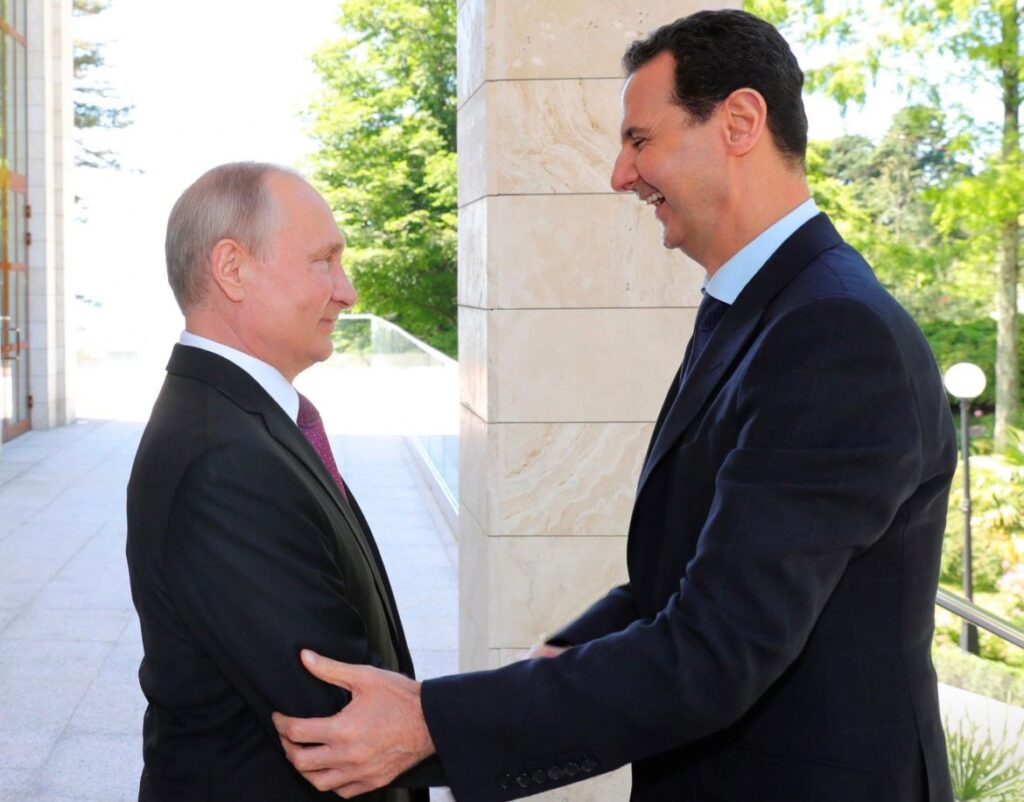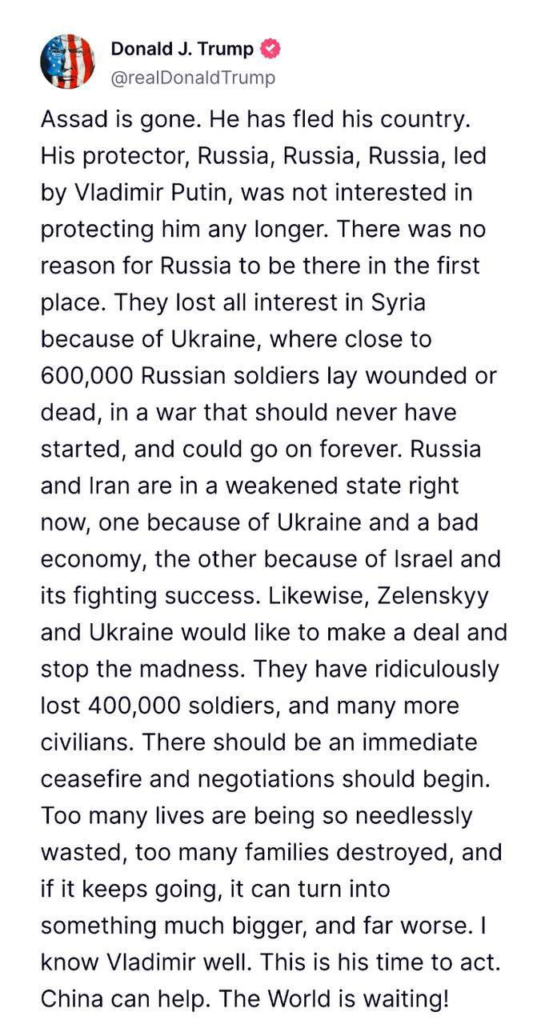Assad’s fall makes a mockery of Putin
But it may not be all doom and gloom for Putin’s regime - or his war on Ukraine


The fall of the Bashar al-Assad regime in Syria has made waves in the Middle East.
In just 10 days, the rebels made up of different factions from various parts of the war-torn country, and led by Syria’s Islamist Hayat Tahrir al-Sham (HTS) group, went from occupying Aleppo to entering Damascus and declaring the end of Assad’s rule.
As per reports, the infamous Syrian dictator was ousted from the country. He and his family have allegedly arrived in Moscow.
Meanwhile, the Russian military personnel are reportedly fleeing the Tartus and Khimeim bases, as confirmed by some Russian military commentators.
They also state that troops are effectively cut off while others are being “relocated” while pro-Russian and pro-Iran accounts are having meltdowns on platforms like X.
For Ukraine, which is at war with both Russia and Iran, these developments play a significant role. Not least because Syria has been a polygon for Russian soldiers and pilots to test their “raze to the ground” strategy now used in Ukraine. As well as Putin’s cherished military achievement in the Middle East that emboldened him to take further action against Kyiv.
Opportunistic Russia
Whether or not the Kremlin had seen the rebel takeover coming is an open debate.
Certain signs of what Russia could expect in the region, marred by tensions, emerged some time ago.
In October, Israel struck the ammo depots next to the Khmeimim air base, defying Russia’s earlier threats against the country. This was coupled with its successful takeout of Putin’s allies in the region, including Hezbollah and Hamas’s leadership. And the IDF’s openness about their capturing Russian-made weapons in the terrorists’ tunnels.
The speed with which the operation occurred shows that it was likely a premulled event. Who helped orchestrate it and how have yet to be revealed; however, the consensus is that the amount of planning and thought put into it is exceptionally high.
Türkiye has officially rejected its involvement, with Omer Celik, spokesman for Turkish President Recep Tayyip Erdogan’s ruling party, saying that “all statements that claim Türkiye provoked or that Türkiye supported this are untrue. They are all lies.”
Meanwhile, Israeli Prime Minister Benjamin Netanyahu recorded a video where he claimed credit for starting the chain of events that led to the sudden fall of Assad.
“This is a historic day in the history of the Middle East,” Netanyahu said during a visit to Mount Bental on Israel’s border with Syria. “The Assad regime is a central link in Iran’s axis of evil — this regime has fallen.”
For Putin, all these events combined are undoubtedly a major reputational loss. More so since a video re-emerged where the Russian dictator is seen giving a speech in Syria in 2017, pledging to station Russian troops permanently at the two bases in Syria and threatening the “terrorists with an unseen response” should they take any action “ever again.” The hasty fleeing of Syria is likely not “the unseen response” Putin had in mind.

But the currently jubilant sentiment mustn’t eclipse reason either. On the one hand, Putin’s regime is humiliated, with President-elect Donald Trump writing largely unflattering tweets addressed toward Moscow, indicating that he doesn’t view Russia as an equal while ruling out any US engagement despite Assad reportedly reaching out to Trump through intermediaries, asking for help.

On the other, the setback Russia suffered in Syria doesn’t necessarily spell doom and gloom for Putin’s regime.
Speaking in a personal capacity, American COL. Nathan Colvin on duty agreed that Putin’s image took a hit due to the loss of the two bases. But he also added that it’s “a mixed bag for Russia” because “Russia is nothing if not opportunist.”
“Just because they get pushed out of Syria doesn’t mean they’re not going to find someplace else to go. Rather than to bemoan their loss of influence in Syria, they’ll probably just move there in their operations elsewhere,” he said, adding that Moscow serves as a disruptive force that seeks to undermine Western liberal institutions wherever possible.
Once the dust has settled down
Colvin added that what matters is what happens once the initial happiness has faded away and the internal vying for power begins.
Middle East expert Dr. Omar Ashour likewise cautioned against preliminary conclusions as it’s unclear who’ll control Damascus since the coalition of rebels is a motley crew that has different state sponsors, including Jordan, Türkiye, UAE, the US, and more.
He added that not all in the coalition are that anti-Russian so there’s a possibility that some sort of cooperation will resume and that different actors could eventually confront each other.
“If they manage to stop the fighting with guns and take it to elections, court, and the media, it’ll be a big success mainly for Syria but also for Ukraine because then you’ll undermine significantly Russian and Iranian influence from there. Also, there’s some gratefulness and some realization among the coalition members in that they’re connected to Ukraine because of the victimhood of the war. I think it’ll be a win eventually for Ukraine if it succeeds. If it collapses, then it’s a partial win,” he added.
Ashour also believes that Assad’s fall is an operational loss for Iran. Meanwhile, for Russia, it’s a degradation in their capabilities.
“The entire armed opposition, composed of different coalitions, agree that Iran has no place in Syria. This could even perhaps be a strategic defeat for Iran,” he said, adding that Russia will likely re-deploy its military equipment from Syria to Libya rather than to Ukraine as “they don’t have access to the Black Sea through the Mediterranean.”
Meanwhile, Colvin believes that Iran may still influence the war-torn country. Or that Türkiye and Israel begin cooperation that could benefit both states. They could seek to attain their regional goals in the embattled area while preventing a vacuum of control from occurring.
“I’d much rather see Türkiye and Israel be working with these factions than Iran and Russia,” he added.
Whether or not Ankara and Jerusalem collaborate remains an open question, given Erdogan’s high recent support for the Palestinian cause.
Israel has already carried out several strikes in Syria today, targeting ammunition and weapons depots at the Khalkhalah airbase in Suwayda, several sites in the Daraa Governorate, and the Mezzeh airbase in Damascus.
It also makes no secret of its animosity toward Iran, with whom it exchanged fire this year, and has called on the Iranian people multiple times to liberate their country from Mullah rule, which could mean further action in the region.
But will it lead to Putin’s collapse?
The collapse of the Assad regime certainly has given plenty of optimism to those willing to draw a parallel between Damascus and Moscow.
But caution is necessary, as, despite its highly limited territorial successes in Ukraine and deteriorating economic condition, Russia has repeatedly proved agile in taking losses, even of magnitude akin to “capture Kyiv in three days.”
“They’re taking huge losses. The highest seen since probably World War Two or Vietnam. Certainly, well past the Soviet Afghanistan campaign,” Colvin said, adding that they’re also showing tactical adaption on the battlefield.
Meanwhile, Putin, whose only real goal is to stay in power, has yet to reach the populations of Saint Petersburg and Moscow, who do not feel the war’s direct impacts.
“We’ll see if there’s a definitive change when he runs out of kind of reserved materials and he sucked up all the materials from partners,” he said, adding that there’s a difference between the Russian operations in Ukraine collapsing and the Russian government collapsing.
Neither is very realistic, but the former isn’t fully ruled out and ultimately depends on what happens after Donald Trump takes office on 20 January 2025.



